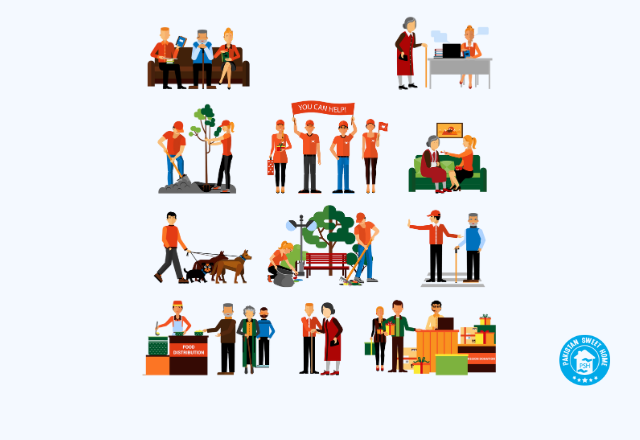The benefits of helping others are far greater than you might imagine, and they begin the moment you take action.
It uplifts both the giver and the receiver, creating a deeper sense of connection and purpose. Beyond the immediate impact, acts of kindness boost mental well-being, increase happiness, and strengthen communities.
When you help others, the benefits extend beyond them—you enrich your own life as well.
Ready to experience the joy of making a real impact?
Here’s why you should start helping others today.
1. Promoting Happiness
Helping others stimulates positive changes in your brain, boosting happiness and enhancing overall well-being.
Research shows these "highs" occur in the brain's reward centers, similar to those activated by food or other pleasurable experiences. This initial surge of happiness often leads to long-term calmness and fulfillment.
Interestingly, gift-givers report more joy than recipients. People who regularly help others also experience higher self-esteem, improved psychological health, and greater happiness.
When you help someone or give a gift, your brain releases "feel-good" chemicals like:
- Serotonin (which helps regulate your mood)
- Dopamine (which provides a sense of pleasure)
- Oxytocin (which fosters a sense of connection with others)
2. Creating a Sense of Belonging
Helping others empowers your connection with the community and fosters new friendships. It refines your human connections, fulfilling the innate need to bond with others.
Helping others creates opportunities to connect with teammates and those you assist, fostering a sense of belonging. Face-to-face activities such as volunteering at homeless shelters reduce loneliness and feelings of isolation.
Engaging your children in community service makes family members' bonds stronger while teaching empathy and compassion.
3. Finding a Purpose
Contributing to the lives of others not only fortifies your sense of purpose but also strengthens your identity. When you help those in need, you experience a deep sense of fulfillment, knowing that your actions have made a meaningful difference.
This sense of accomplishment empowers you, raising your self-confidence. It also helps you feel more connected to both yourself and the world around you. The rewards of giving extend beyond the immediate impact. Helping others can inspire personal growth and bring long-lasting satisfaction.
4. Gaining a Perspective
Supporting less fortunate individuals helps shift your mindset, encouraging gratitude and a more positive view of your circumstances. Helping others radiates positivity, diminishing space for anger, resentment, or hatred, which can harm mental and physical health.
5. Inspiring Generosity
Acts of kindness spark a chain reaction, motivating others to follow suit. This creates a ripple of goodwill throughout communities. Generosity helps shift focus to gratitude, stabilizing emotional health, and encouraging appreciation for your blessings.
Helping neighbors, organizing events, or aiding the less fortunate sets an example for others to follow. These actions inspire optimism, happiness, and confidence in both you and those around you, building a happier, more compassionate community.
6. Improving Longevity
Regularly helping others enhances social interactions, leading to greater satisfaction. One can live longer and can extend the life expectancy rate.
Studies reveal that regular helpers, such as those who participate in monthly activities at shelters or soup kitchens, reduce early mortality by 22%. Helping others also decreases depression and fosters life satisfaction.
7. Renewing Yourself
Helping others can be a powerful source of emotional healing, especially during challenging or low points in life. Helping others also decreases depression and fosters life satisfaction. It promotes emotional well-being, proving that doing good can make you feel great.
Imagine volunteering at a shelter, or simply offering a listening ear to a friend going through a tough time. The act of giving not only provides a sense of purpose but also brings a sense of fulfillment and empowerment.
8. Boosting Self-Esteem
Consistent helping others builds confidence and boosts self-esteem by providing opportunities for growth and accomplishment. For instance, if you regularly mentor students in a local after-school program, you help them improve academically. At the same time, you also develop your own leadership and communication skills.
Seeing the progress and success of the students you mentor reinforces your belief in your abilities. This, in turn, helps build your confidence. The sense of purpose and positive impact you experience through mentoring increases your self-esteem. As you recognize your contributions are making a difference, it ultimately fosters personal growth.
9. Strengthening Friendships
Acts of kindness create a positive atmosphere. They also help deepen friendships, making them more resilient and lasting. For example, imagine you support a friend through a difficult time.
Whether it’s offering emotional support or simply helping with daily tasks, your kindness makes a difference. This strengthens the bond between you, fostering a deeper connection.
This act of kindness reinforces the bond, making both individuals feel more connected. The positive energy exchanged helps cultivate a relationship that can endure challenges. This leads to a lasting friendship built on trust, empathy, and mutual care.
10. Fostering Optimism
Helping others has a powerful effect on your mindset, lifting your mood. It also encourages a more positive outlook on life.
For instance, volunteering at a local food bank or assisting someone in need brings a sense of joy and fulfillment. You experience the satisfaction of making a positive difference in someone’s life. This sense of fulfillment comes from knowing your actions have had a meaningful impact.
11. Reducing Stress
Acts of kindness trigger the release of "happy" hormones and endorphins, uplifting mood, and reducing stress. These emotions enhance your immune system, protecting against illness. The benefits of helping others provide a reserve of positive memories that uplift your mood later.
Research shows that older people who helped others for at least 200 hours annually saw a 40% reduction in hypertension. This reduction may stem from increased social interactions, which help alleviate loneliness and improve mental health.
How Can You Help Pakistan Sweet Home?
Pakistan Sweet Home, Asia's largest orphanage-based NGO, plays a vital role in transforming the lives of orphans across Pakistan. It provides them with shelter, education, and care.
You can support Pakistan Sweet Home by sponsoring an orphan or donating funds to cover essential needs like health, food, and education. Charitable acts, such as giving your time or expertise, also help provide mentorship and care to children in need.
Raising awareness through social media or personal networks can further encourage others to contribute to this noble cause. Every act of kindness, whether big or small, can significantly improve the lives of orphaned children.
In conclusion, the benefits of helping others extend beyond supporting those facing challenges; they also enhance your well-being. Helping others promotes happiness, strengthens connections, and fosters a sense of purpose.
Acts of kindness improve your physical and mental health while inspiring a more positive outlook on life. By giving to others or to a charity, you receive invaluable rewards, making your life richer and more fulfilling.
Help Us Care for Orphans in Need

info@pakistansweethome.org.pk
(051) 4865856
+92 335 1118477





